Two exciting days of MaaS Conference in Vienna are over. Two days full of defining and informing content, two days of relaxed and engaging networking. Together with our two partners Business Circle and NewMoto and host Christian Clerici we have delivered a package that will last. Last at the very least until the next version of the MaaS Conference will start in 2020.
“We are truly fortunate to have started a dialogue between the Automotive, Energy and Public sector, a dialogue on equal footing, necessary to address all challenges and leverage all opportunities that come along with building the mobility ecosystem of the future”, states Alexander Hotowy (Managing Partner, accilium)
The storyline of the MaaS conference Vienna 2019

Since Mobility as a Service is such a complex topic it is necessary to create a compelling and profound storyline, so we’ve have curated four sections that followed a simple mantra: “Enter 2 days of insightful discussions, valuable and fact-based dialogue with like-minded people, caring about the future of mobility.”
The first section had the city in focus – as the infrastructure is the base to all mobility solutions that may be implemented on top. Later in the first day, in section two, we have shifted the focus to Data as an Enabler – being the second layer of infrastructure in the future of mobility.
Nowadays possibilities to use both infrastructures were discussed at the start of the second day with the showcase of various business models making use of the two. Last but not the least the conference has taken a firm look into the future – more correct the Autonomous Future. “Especially the uncertainty of the future can only be faced with an intense dialogue, so I’m very happy that we’ve brought so many perspectives to the two conference days” concludes Alexander Rauscher (Managing Partner, accilium).
6 Key takeaways of the MaaS Conference Vienna 2019
That storyline proved to be key towards learning many important messages during these two days. Actually way more than the SIX we’d like to share as key messages:
- It´s an ecosystem not an egosystem – Sampo Hietanen
- User experience is the key to success – Martin Essl
- Convenience & Privacy have to go hand in hand – Clemens Wasner & Thomas Fuerstner
- Changing society first, mobility later – Wolf Lotter
- China’s permanent change and relentless try outs might be worth a second look for everyone – Lorenz Führlinger
- You do not have to be an aggregator to be successful – Marcus Spickermann
The main stage with panel discussions and showcase presentation was expanded with an hand-on approach for the participants in seven different so called breakout sessions. “We have thought about how to lower the barrier for participants to be part of the discussion”, states Angelika Rauch (CEO, tbw research).
The varying topics such as the Future City, Enabling Through Data or Speed of Transformation gave practical advises to strongly-discusses topics. The breakout session of Angelika Rauch e.g. featured an intense discussion about the possible achievement of a fair and social future of mobility, always with an eye to involve women more. Also accilium had the great pleasure to host a breakout to present its newest study about “Electric Vehicles: Merger of the Automotive and Energy Industry” together with DNV GL to numerous interested people.
“Ideas are cheap, execution is everything! – is an often stated mantra – but we’ve made sure, that within several breakout sessions participants could work engaged on various topics”, states Peter Allan (Managing Partner, accilium).



Day 1: From Cities and Data – 25th of November
Section 1 : Future City Mobility
The first day started with some warm words from BMVIT’s Andreas Weber answering questions about the national mobility vision that has a strong wish towards expanding the already robust rail system in Austria as the baseline for future mobility and connect every other service product where the rail system is not sufficient.
Following was the Keynote of Wolf Lotter, who brought some deep philosophical questions into the early debate. He leaned toward “a change in society first and in mobility later”. If more people work from home, mobility needs will change more dramatically than with any other measure. There is not a Rush-Hour if there is no rush to get to work in the same time.
That mindset was put to an early test right after in an interview hosted by Georg Retschitzegger from accilium, who had actors from two leading cities in mobility, Madrid and Vienna, by his side. Julia Girardi-Hoog (Head of Department Social Services, Wiener Wohnen) and Sergio Fernandez Balaguer (Project Manager, EMT Madrid) presented the audience with exciting projects of the respective own.Sergio Fernandez Balaguer gave insights to the upcoming city-owned MaaS-project in Madrid, while Julia Girardi-Hoog talked about mobility implementations in social housing platforms in Vienna.
After a short break Wolfgang Pell (CEO, Verbund Solutions AG) hit the stage presenting his vision of more space within the city, since cars take up so much and the dire need to rethink the infrastructure as a whole.
The morning session ended in an exciting panel. Next to Alexander Hotowy (accilium), Alexandra Reinagl (CFO, Wiener Linien), Eveline Steinberger-Kern (CEO, Blue Minds) and Michael Sattler (Head of Future Energy, OMV) discussed about the future implications for a city. Under the remark of “How to keep the status as most liveable city in the world” the participants highlighted the importance of acting together and the importance of the public role.



Section 2 : Data as Enabler for mobility solutions
After the lunchbreak all participants witnessed an inflammatory 30-Minute Pitch for a seamless mobility experience. Adam Vissing (VP Sales & Business Developmentm, IXOPAY) introduced the audience to the bold statement of “For truly seamless customer experiences, payments must disappear.”
The afternoon was filled with such insights. In a interview session Leonhard Kühne-Hellmessen (accilium) went into a full deep-dive with Clemens Wasner (CEO, enlite.AI) and Thomas Fuerstner (CTO, Riddle & Code). Both are experts for Artificial Intelligence and Blockchain respectively. What these two mechanics have in store for future mobility was the groundwork for the interview. But even more important was the question towards the audience “What do you prefer more: Convenience or Privacy?”. As it turned out it was 50:50 and people are still undecided what to prefer. But the good news is both speakers have highlighted that in the future both can go hand in hand.
After the Coffee Break Reinhard Birke (CEO, Upstream) had a beautiful message to share in his engaging presentation: Upstream’s main aim is to create an anti-discriminatory mobility management from cities to citizen not corporates to customers.
Last part of the storyline for the day was a panel discussion between Marcus Frantz (CIO, ÖBB), Martin Russ (CEO, Austriatech), Michael Kieslinger (CEO, Fluidtime) and Oliver Schmerold (CEO, ÖAMTC) and one of the highlights of this year’s MaaS Conference. Leading through that discussion was Christian Schneider (accilium). That powerful panel was searching for the right way, the right way for Austria in a globalized future to deal with the sheer amount of available data. It became philosophical at some points, which build a organic frame to the day’s opening of Wolf Lotter. To partner up – throughout Austria – throughout Europe was the key message from the main stage at this point.



The Dating Dame
The exciting first day has not yet come to an end though. The re-thought of a start-up pitch session with a legendary moderator – Christian Clerici in the very successful setting of “The Dating Game” was the perfect introduction to the networking evening. As the host Christian Clerici stated: “Humour is the base to change – it is an requirement to establish a culture that allows change to happen”
The contestants, as shown in a video clip on stage, were in best company, as no other but Steve Jobs and Bill Gates have appeared in such a format 1983 discussing the future of Apple and Microsoft.
The “Bachelor” Gregor Stratil-Sauer (Referat Mobilitätstrategie, Stadt Wien) was introduced to three wonderful ideas of the likes of Christine Scharinger (CEO, Hydrofy), Robert Steinböck (Head of Moon, ALLMOBIL and Thomas Grimm (COO, S O NAH). All contestants tried to win over the heart of Mr. Stratil-Sauer by presenting their ideas of bio-methane extraction from all-natural sources, a public place for electro-mobility and tech-hub and the sensor-driven city-scanning to e.g. generate live-parking data. It was a very though joice but the win was taking home by Christine Scharinger and Hydrofy!


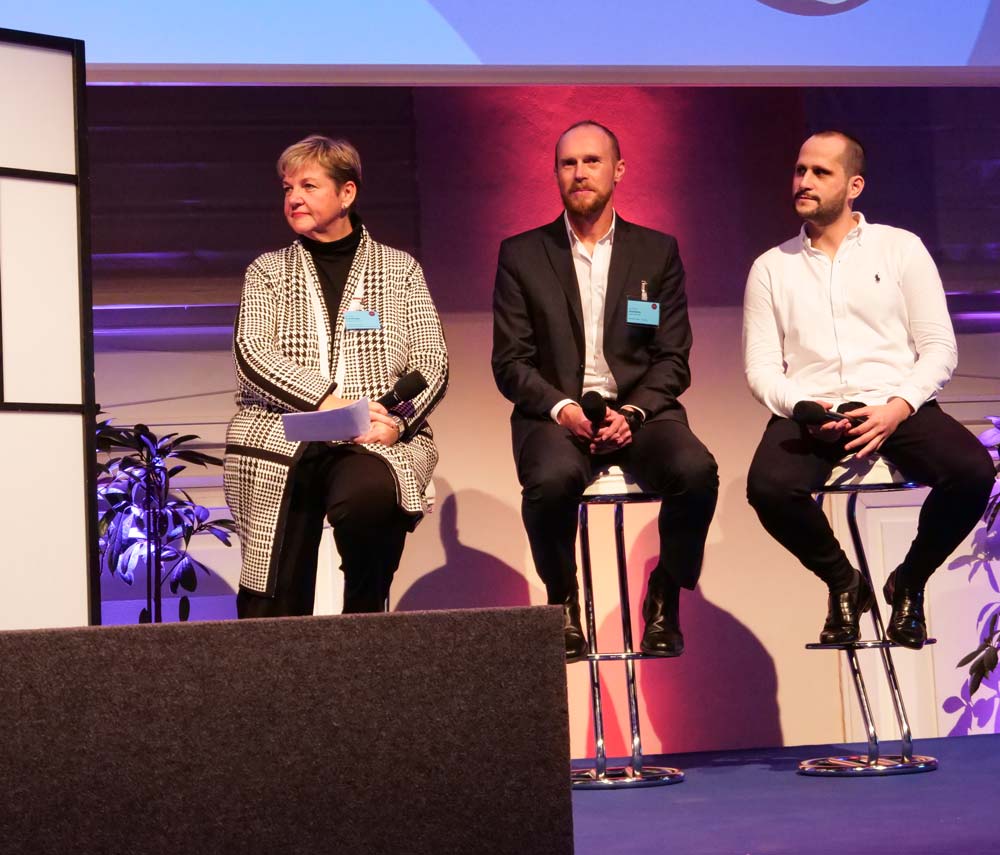
Day 2: New Business Models in Future Mobility – 26th of November
Section 3 : Business Models
Starting early in the morning a wake-up call was very much needed. Stephan A. Jansen (Professor Karlsuniversität & CEO of BICICLI) entered the stage with a self-proclaimed “provocative hug” and he delivered!
Opening the keynote by stating that “cars are the new meat – and new morality is the most important factor for or against the automotive industry“ which was addressed by all following speakers as well as obviously in the coffee breaks.
As the first showcase of the day, Augustin Friedel (Intermodal Strategies, Volkswagen) presented the future vision of automotive powerhouse Volkswagen in terms of mobility services. WeShare, Volkswagen car sharing service, is following a unique strategy of all-electric vehicles.
A vastly different strategy followed by Martin Essl (Head of Austria, Uber). Proclaiming Uber as the operating system for everyday life and showcasing Uber’s strategy towards a mobility provider far outside of ride-hailing.
After the break Sampo Hietanen (CEO, Whim) tried to win over the audience to sell their car. Whim as a full-throttle Mobility-as-a-Service provider and Sampo Hietanen as the MaaS-pioneer himself left good arguments to use their newly launched Service in Vienna.
After the break introduced by a exceptional road-trip video with Christian Clerici and Alexander Hotowy, Marcus Spickermann (CFO & Head of Growth, Volvo Cars Mobility) entered the space and gave a sneak-peak to the newly launched carsharing product “M” that will win over people in Stockholm by not being an aggregator but more a partner in every days life.



Mr. Spickermann stayed on stage for the following panel-discussion that had him in company of Ingmar Höbarth (CEO, Climate & Energy Fund), Martin Waldbauer (Procurator, Taxi 31300) and Mario Eibl (CEO, Gleam). Leading through that diverse panel was Ulrike Witzmann (CEO, The Change Journey). Under the umbrella of the bold statement “The problem of mobility remains unsolved” the participants have come to agree that high diversity in terms of offerings is vastly important in the future.



Section 4 : Autonomous Future
Starting the last afternoon of the conference under the question of transformations in the past, Paul Blaguss (CEO, Blaguss) was interviewed by Christian Clerici in the search for analogies of transformation pattern in the past. For a successful future strategy it’s necessary to find joy in constant change. As we would say you have to be “built to evolve”.
Right after Alexander Hotowy took the stage together with Lorenz Fürhlinger (COO of Development Chassis, Autonomous Driving, AUDI) to deep-dive into Chinese-European implications. China’s shift from copycat to innovation leader is as impressive as the deep knowledge presented in the interview, which is based on the build-up of Audi’s R&D center in Hong Kong and plenty of years of work experience in China altogether.



Ending the two days was a fantastic line-up with an automotive focus – discussing future implications of autonomous driving and varying business models that might occur because of it. Welcomed on stage by presenter Alexander Rauscher (Managing Partner, accilium) were Jochen Stich (Head of Innovation, Porsche Holding), Jost Bernasch (CEO, Virtual Vehicle), Wolfgang Buschan (Director Industries & Applications, Scania) and Horst Bischof (Vice-Rector, TU Graz).
The final panel gave plenty of interesting verdicts for the future of the automotive industry. Change and autonomous driving will come, but will it come in different waves? It may not start in an urban environment first, but most likely in commercial vehicles. If these vehicles and surrounding services will prove successful plenty of possibilities for cities and future business models will present itself.
The article was published by Tobias Luksch
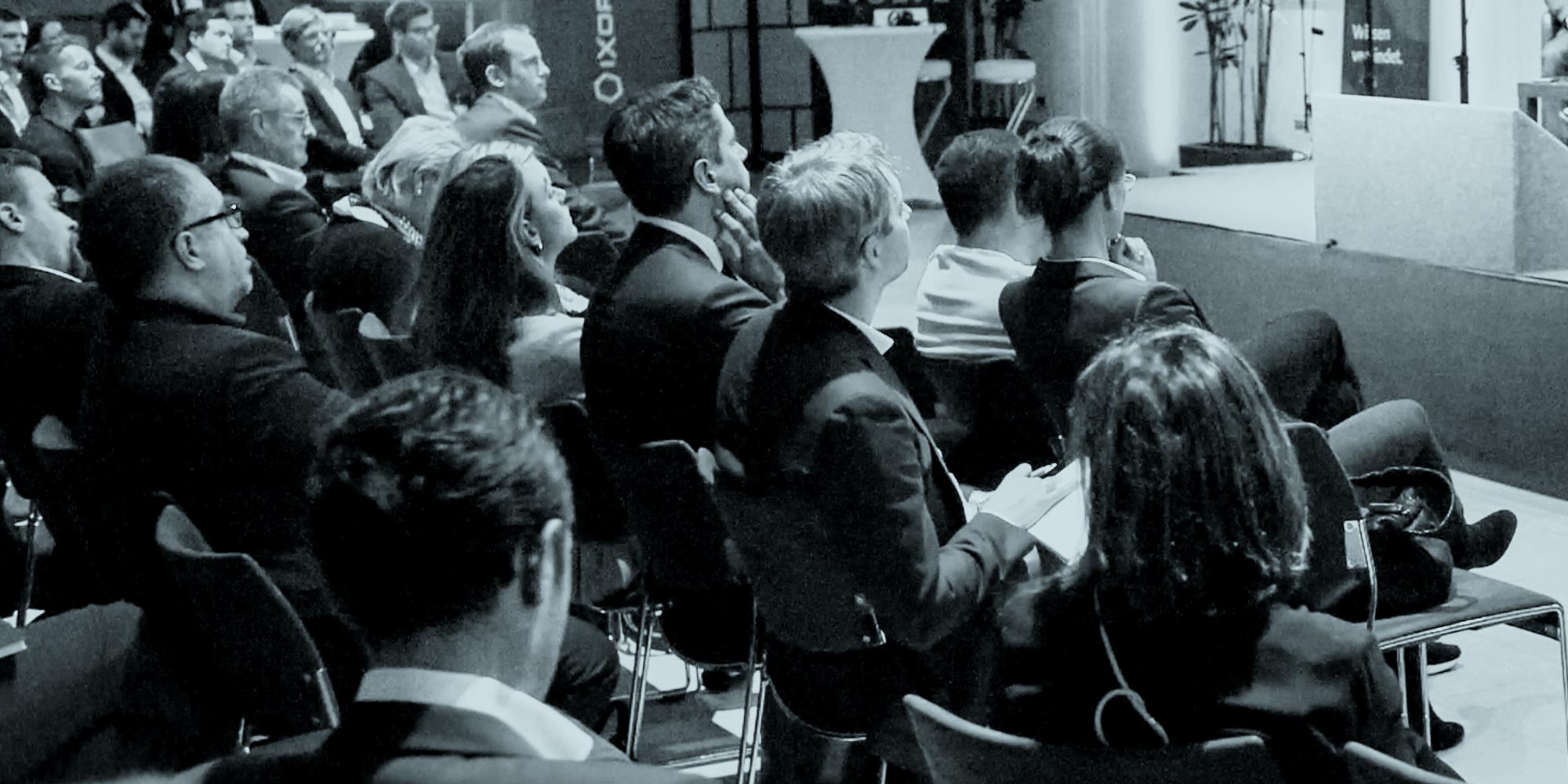

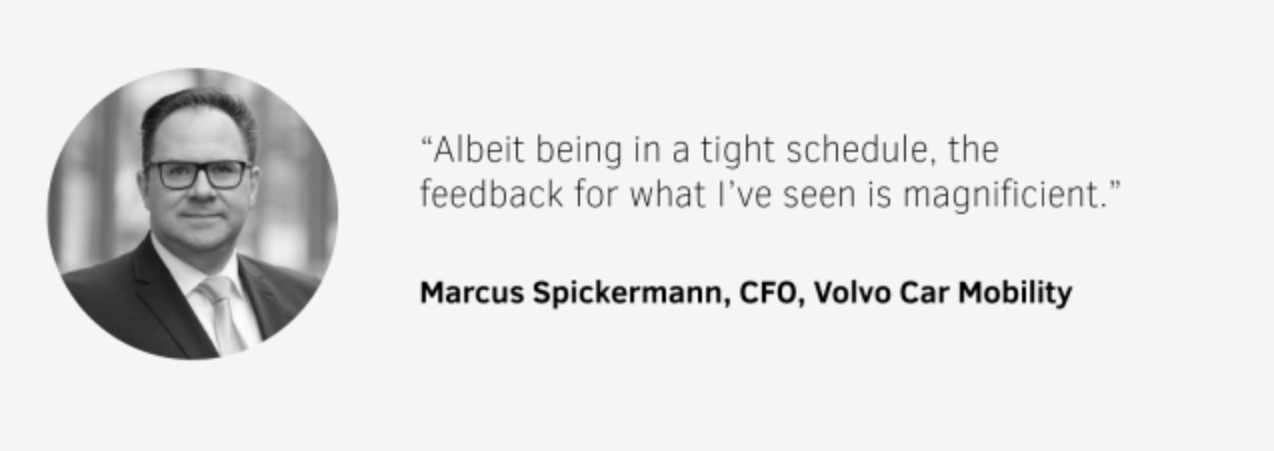







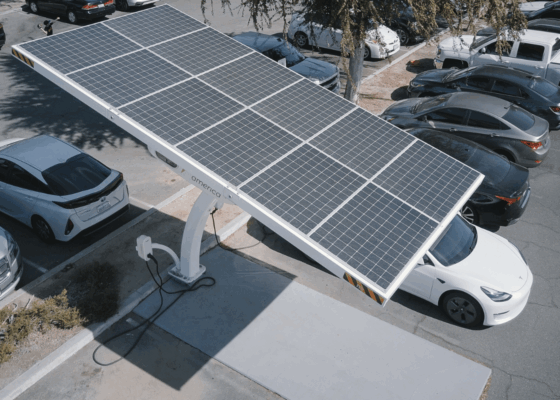
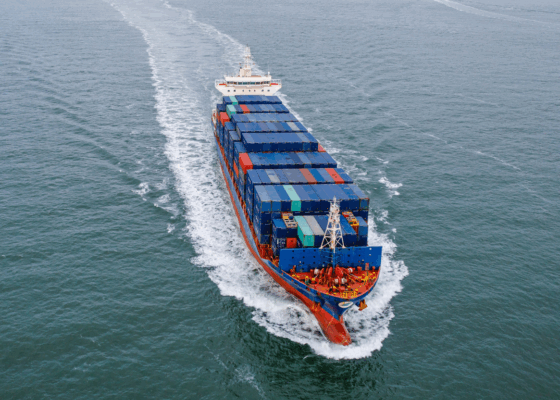
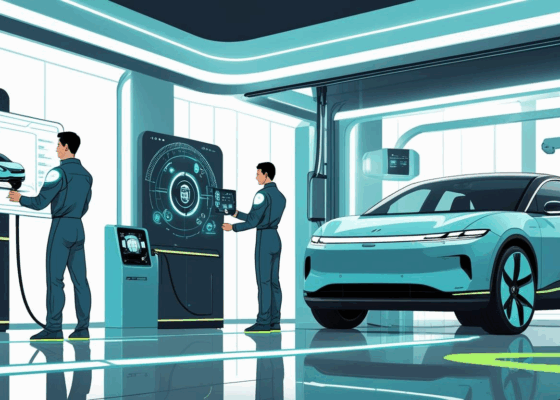

 ISO/IEC 27001:2013 certified
ISO/IEC 27001:2013 certified